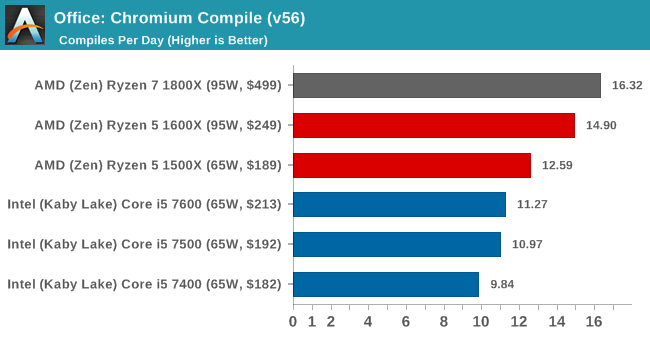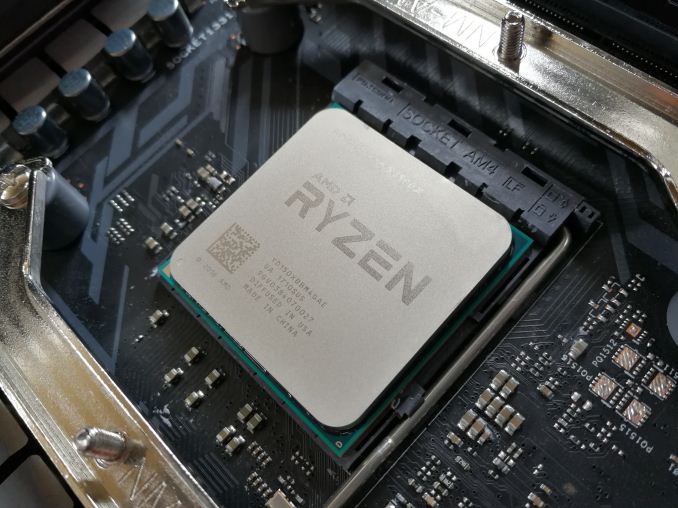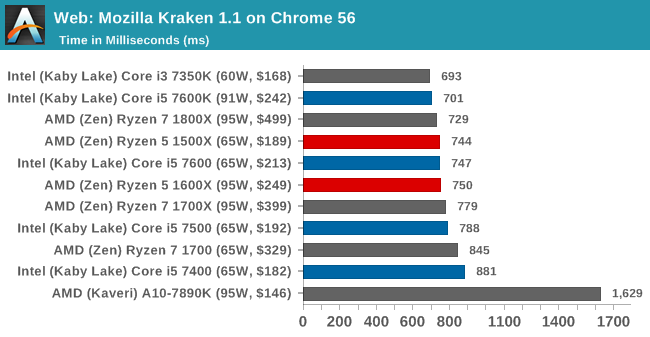The AMD Ryzen 5 1600X vs Core i5 Review: Twelve Threads vs Four at $250
by Ian Cutress on April 11, 2017 9:00 AM ESTAMD Ryzen 5
We mentioned at the top of the review that AMD’s Ryzen 7 launch last month benefited in a market where the competition was extremely expensive – being able to offer equivalent performance in most tasks and then undercut the competition by 50% is a difficult task, but the opening was always there due to a lack of competition in this space. When it comes to the mainstream market, the Ryzen 5 processors are actually competing on price with Intel’s processors directly, and thus has to offer something more to compete.
We have already shown in previous reviews that the Zen microarchitecture from AMD is around the equivalent of Intel’s Broadwell microarchitecture, but at this lower price point we have AMD’s Zen against Intel’s Kaby Lake, which is two generations newer than Broadwell and affords a comfortable IPC uplift over Broadwell. Given AMD’s monolithic design strategy of a single silicon die catering for most of their product line (well, all of it so far), the way AMD is tackling this is through more cores.
Before the debate about cores from AMD’s past rears its head (Vishera/Bulldozer designs in that case), given that AMD’s single thread performance is not too far behind, having a big set of cores as an alternative is something interesting for end-users, especially as more work flows and gaming titles rely on multithreading to scale. As a result, where Intel offer four cores and four threads, AMD is now offering six cores and twelve threads – a potential +200% uptick in the number of threads and +50% in cores, albeit at 10-15% lower instructions per clock.
(There’s also a side argument here about die sizes and wafer costs to each company to consider, but we will leave that for a different piece.)
For this review, based on time and available parts, we tested the Ryzen 5 1600X six-core processor against a set of Intel Core i5 parts that users might also be considering. We have some Ryzen 5 1500X quad-core numbers in here as well, and that might be spun out into a separate review at a later date. We also demonstrated our new 2017 CPU gaming tests, with four GPUs, six tests, two resolutions per test, and a couple of extra extreme resolution tests.
On The Benchmark Results
Looking at the results, it’s hard to notice the effect that 12 threads has on multithreaded CPU tests. The usual culprits show big wins for AMD here: 2D to 3D photo conversion, ray tracing, Blender, Cinebench, Encryption and video transcoding are all sizable wins. This is the sort of workload in which moving up to the Ryzen 7 CPUs, budget permitting, also do well on.
A new test in our suite for this review is a Compile Chromium test on Windows. As part of our testing suite, we have a fixed nightly download from mid-March and set this to compile, taking the final time and converting it into how many compiles per day. For around $250, Ryzen is the only way to go:

As you would expect, AMD still lags in IPC to Intel, so a 4.0 GHz AMD chip can somewhat compete in single threaded tests when the Intel CPU is around 3.5-3.6 GHz, and the single thread web tests/Cinebench results show that.
On The Gaming
Our gaming tests are a mix of Full-HD and 4K testing, some of which ends up being more CPU limited than we expected.
Civilization, at both 1080p and 4K Ultra settings, seem to scale quite happily with more cores on all GPUs, except the GTX 1060 at 4K. It’s worth noting situations such as the R9 Fury at 1080p Ultra only has 920ms under 60 FPS on the 1600X, compared to 6300 milliseconds on the Core i5-7600.
Shadow of Mordor leans towards the higher IPC of Intel, as the DX11 title cannot take advantage of the cores as much. Rise of the Tomb Raider’s benchmark is notorious for having each of its three seconds perform differently with respect to CPU scaling, with the Prophets scene being more CPU limited than the rest of the stage in the game.
Rocket League using an AMD CPU + AMD GPU actually provides more equal results with NVIDIA GPUs, however there's a performance drop using Ryzen + NVIDIA, which potentially correlates towards a driver bug but we're not 100% sure what is going on. Grand Theft Auto is a mixed bag, despite being a DX11 title – in some situations the Ryzen 5 is ahead of the Intel CPUs, or they all perform about the same, or the Intel CPUs pull ahead.
I have $250, What Should I Get – the Core i5 7600/7600K or the Ryzen 5 1600X?
Platform wise, the Intel side can offer more features on Z270 over AM4, however AMD would point to the lower platform cost of B350 that could be invested elsewhere in a system.
On performance, for anyone wanting to do intense CPU work, the Ryzen gets a nod here. Twelve threads are hard to miss at this price point. For more punchy work, you need a high frequency i5 to take advantage of the IPC differences that Intel has.
For gaming, our DX12 titles show a plus for AMD in any CPU limited scenario, such as Civilization or Rise of the Tomb Raider in certain scenes. For e-Sports, and most games based on DX9 or DX11, the Intel CPU is still a win here.












254 Comments
View All Comments
Meteor2 - Wednesday, April 12, 2017 - link
Benchmarks: I love the new Chromium compilation and straightforward 4K h264->h265 tests. Bravo.Lehti - Wednesday, April 12, 2017 - link
As it is, the Ryzen 5 lineup is a compelling purchase, even for us European who usually get awful deals with PC components. If AMD released it as an APU lineup, however, this would be a no-brainer for everyone. And yes, I know that Ryzen 5 chips are basically binned Ryzen 7s, but still...vladx - Wednesday, April 12, 2017 - link
Can't agree there, I'm from Europe and the 7600k is only around $20 more expensive than the Ryzen 1500x and it beats it in a lot of games and also fares better in office workloads. And that $20 gets at least even out when you put in consideration the Intel B250 motherboards which are $20-40 than competing AMD B350 mainstream offers.Meteor2 - Wednesday, April 12, 2017 - link
Where in Europe are you? In the UK the R5 1500X is $80 cheaper than the the i5-7600K.t.s - Wednesday, April 12, 2017 - link
You're focusing in single threaded apps / games, again, and again, and again. Not everyone use they computer for ST apps / games. And when you factored it in, R5 is very compelling product.vladx - Thursday, April 13, 2017 - link
That's true but enthusiasts and prosumers are maybe 2% of the market, the rest 98% won't use their PC for more than browsing the web, watching movies and basic office work.deltaFx2 - Friday, April 14, 2017 - link
@vladx : That's true but if browsing the web, watching movies, and basic office work is all you do, Excavator is perfectly fine for you. I expect people buying 7700k or R5 or even some i5s have some workloads that justify the expense. This is especially true of Ryzen as the current crop need an external GPU. IIRC Raven Ridge desktop parts come only next year.Sages - Wednesday, April 12, 2017 - link
Would it be possible to do another power review with ryzen like you guys did with Carrizo in 2016? Or do you guys not have the equipment for that? For me as a electrical engineering student that article was very interesting. Keep up the good work!!TheJian - Wednesday, April 12, 2017 - link
"A side note on OS preparation. As we're using Windows 10, there's a large opportunity for something to come in and disrupt our testing. So our default strategy is multiple: disable the ability to update as much as possible, disable Windows Defender, uninstall OneDrive, disable Cortana as much as possible, implement the high performance mode in the power options, and disable the internal platform clock which can drift away from being accurate if the base frequency drifts (and thus the timing ends up inaccurate)."Or you could have just used Win7 since 1/2 the world still uses it and don't plan on quitting it until well after 2020. Until I see someone actually REVIEW these chips with win7, they won't get my money. Vulkan runs on everything, I have no need for dx12 (all everything you guys just mentioned plus all the tracking etc etc). With no apu crap involved here, you should test win7 if only to show if there is any differences. Considering most of the issues are bios fixes it seems (motherboard), no reason to abandon win7 in testing. Again, half of your readers are using it, more than 2x win10, and many of these people are stuck on it because they don't know how to get back to win7...ROFL
I can't wait for everyone to drop dx12 once whatever they're working on currently is done (many too far along to quit right now in a current game build). I think we'll see many more Vulkan/dx11 only announcements later this year. No point in a dev supporting an OS (dx12 I mean) that was given away for a year and still can't hit 1/2 of win7's users, not to mention many woke up an were accidentally "upgraded" to win10 with no ability to get back reliably. Uninstalling it doesn't always work (and many don't own win7 discs to get back in cases like Dell etc for some people) ;)
But hey, keep acting like win7 doesn't exist much to the chagrin of your readers.
vladx - Wednesday, April 12, 2017 - link
"Until I see someone actually REVIEW these chips with win7, they won't get my money."Who are you punishing here, but yourself? You probably shouldn't anyway because neither Ryzen or Kabylake are supported on Win7.